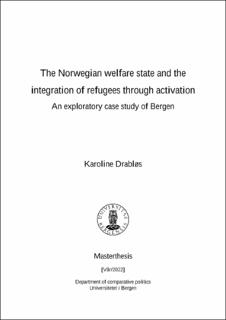The Norwegian welfare state and the integration of refugees through activation. An exploratory case study of Bergen
Master thesis
Permanent lenke
https://hdl.handle.net/11250/3013208Utgivelsesdato
2022-06-22Metadata
Vis full innførselSamlinger
Sammendrag
Within the field of immigration research one particular topic keeps resurfaces, namely how will immigrants affect the welfare state, a discussion that is often focused on how to protect the welfare state from immigrants. There are, however, less research on how the welfare state in turn can affect immigrants, specifically their integration. This is a topic that needs to be explored, especially with the trend of activation in Europe. For the past decades there has been increased conditions of work for getting welfare benefits. This can be challenging for many immigrants, but more so for refugees who often struggle in the labour market. This has led me to ask the following question: How does activation within the Norwegian welfare state promote the integration of refugees? Previous studies suggests that while skills and qualifications of refugees are one of the main reasons for why they struggle to integrate, it is not a sufficient explanation alone. Instead, there are research which suggests refugees face additional institutional barriers through their admission policies, the labour market, and the welfare state. To properly explore how this affects the integration of refugees I first conduct a case study in Norway and look at the various laws and government documents that frame their integration policies. The findings from this suggest that these institutional barriers do occur and that welfare regimes are a significant factor for this, but not a sufficient explanation alone. To really understand how the institutional barriers affect refugees’ integration I have also conducted a case study in Bergen. This is necessary due to the state structure of Norway which gives municipalities the role of service providers for the welfare benefits. It is at the local level I can study how refugees are integrated. Here I look at the various qualification programs targeted at immigrants specifically. What I have found suggests that activation does in many ways promote integration, and while it can be a good way to include refugees, for some people the focus on labour market participation can be exclusive.
